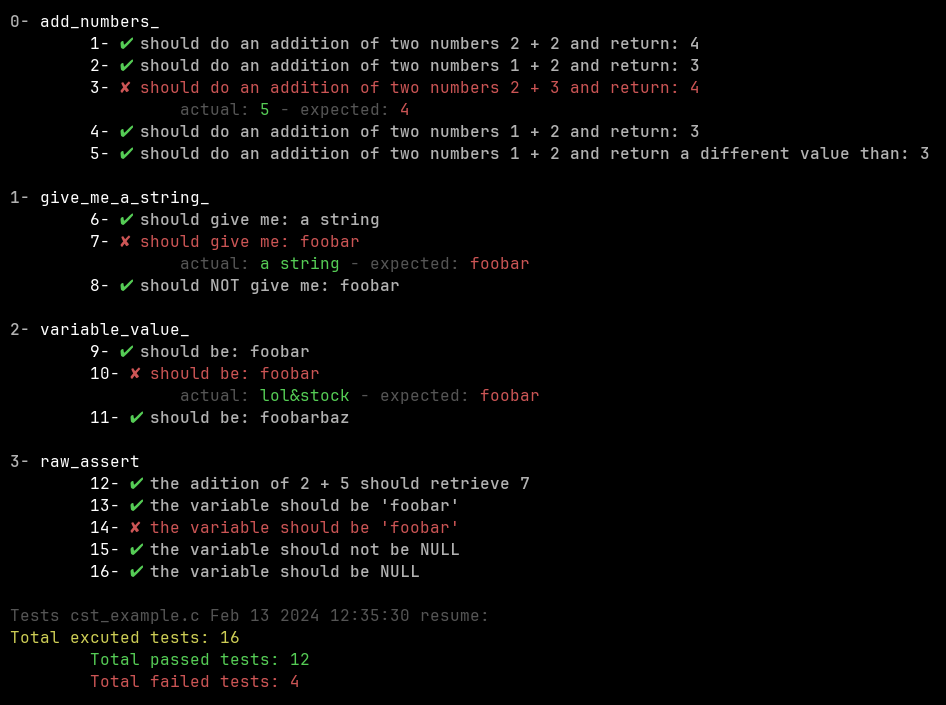🎡 Reinventing The Wheel Group presents 🎡
C Simple Test
There are lot of c test frameworks, but this is mine.
Here we are trying to keep the c tests approach simple as possible; also trying to add some beauty to it like adding colors etc. Ok, there are some developers with a very strong negative opinion about colors around the terminal. I love colors, and most for test and logs outputs though.
- Why reinventing the wheel here, writting another test framework for c?
TL;DR: Just because & 'cause it's fun.
For a more elaborated, but still non-sense, answer check Long Answer section.
For an integer use cst_i for a string cst_s or the not equal for both cst_i_ne and cst_s_ne.
These 4 functions expects 3 arguments:
- function_to_test()
- "assertion text"
- expected_value
- assert an integer
// |-> the function to test or actual value
// | |-> text for the assertion
// | | |-> the expected value
// | | |
cst_i(add_numbers(2, 2), "should do addition for 2 + 2 and return", 4);
// a value different than
cst_i_ne(add_numbers(1, 1), "should do addition for 1 + 2 and return a different value than", 3);- assert a string
// assert a string
cst_s(give_me_a_string(), "should give me", "a string");
// string not equal
cst_s_ne(give_me_a_string(), "should NOT give me", "foobar");Use the cst_a function that expects two arguments:
- "text for the assertion"
- a condition
- raw assert
// |-> text for the assertion
// | |-> the condition to test
// | |
cst_a("the adition of 2 + 5 should retrieve 7", add_numbers(2, 5) == 7);
cst_a("the variable should be 'foobar'", strcmp(variable, "foobar") == 0);
cst_a("the variable should not be NULL", variable != NULL);On your test file, include cst.h and the header files from your code that has the functions that you want to test. At the test file, call all the tests and then call the cst_results() function.
Under the examples directory you'll find the whole setup and file structure and basic usage.
The structure for testing could be something like this:
my_code/
├── README.md
├── src
│ ├── dep.c
│ ├── dep.h
│ └── main.c
└── tests
├── cst_example.c
├── cst.c
├── cst.h
└── Makefile
Put cst.c and cst.h somewhere (on test folder is fine, I did not in order to not duplicate files) and point to the cst.c on your Makefile and the c files from your tests. Something like:
$(CC) $(CCFLAGS) -o $@ $(SRC) ./../../cst.c cst_example.c $(LIBS)
Remember to not include your main.c file from your source code. This would be usefull:
SRC := $(shell find ./../src/ -type f -name '*.c' ! -name 'main.c')
tip: reusing the Makefile at examples/tests/ and modifying the cst files location and tests c files should do the work.
Then go to the tests fodler and run:
$ make clean && make
The More long answer: For a personal c project, I face the Eternal Return or Eternal Recurrence of the leak of test. Just to ilustrate the situation consider the next sequence:
- Starts as a fun PoC, with few lines of code. So I do not even think about writing tests, just the stuff working is a "test" itself.
- I like it and I start cleaning the code, do some refactors.
- I add some functionality that came out to my mind during steps 1 & 2, the lines starts growing. Still so small to write any test though.
- I leave the project for several weeks.
- I start working again on the personal project, I had some new ideas. More lines, more files, more functionalities, more refactoring. . The idea about having some tests starts to cross my mind; but hey still something small.
- If I continue with the idea, I could repeat 4 and 5 several times.
- Once again I regret myself about the absence of tests. I did not learn the lesson yet. Write the f** tests at least on step 3 or 5!
So for first time (dealing with c) I was facing step 7 and I decided to add tests. Then; do a search on StackOverflow; try lot of things. Most of the alternatives that I found required to install dependecies or was so much complicated compared with my current needs. Suddenly I found this brilliant answer at StackOverflow site Minunit, answer that I upvoted (of course) that leads to JTN002 - MinUnit -- a minimal unit testing framework for C. This whole test thingy it's based on this.
Feedback from usage and contributions are very welcome.
Also if you like it, please leave a ⭐ I would appreciate it ;)
